Dental Implant in Poland
Search and Compare the Best Clinics and Doctors at the Lowest Prices for Dental Implant in Poland
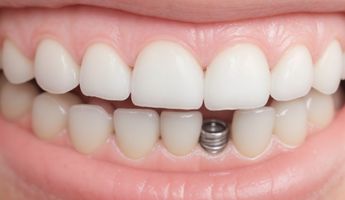
Find the best clinics for Dental Implant in Poland
With Medijump you can browse 27 facilities offering Dental Implant procedures in Poland. The cheapest price available is $534 in Szczecin. And for the cheapest price globally, prices start from $1 in Vietnam.
Dental Implant in Szczecin
Price: $ 534
Dental Implant in Krakow
Price: $ 534
Vietnam offers the best prices Worldwide
Price: $ 1
From 13 verified reviews
Daria Rrr, 27 January 2019
I heartily recommend! Thanks to the doctor, I regained my smile and self-confidence! I thought I would never smile again! Very affordable prices! And above all, friendly service, friendly atmosphere and forbearance, even in the worst cases, as it was with me. I met people who really want to help the patient and that counts for all the staff (For you doctor but also for the hygienists who explain the oral hygiene in detail and are very pleasant)
From 2 verified reviews
Jonny O Malley , 15 February 2020
Highly recommend .. great work guys, thanks for looking after me during my stay
From 1 verified reviews
Rafal gruba, 01 October 2019
Good staff and great setting
From 1 verified reviews
Alexander Jems, 12 February 2020
Seems I got in just before COVID really hit, and I'm so glad I did. Saved a fortune on my implants. Well recommended this place.
From 53 verified reviews
Malwina Jane, 26 August 2020
I am not your patient yet, but I am impressed with the quick and accurate answers to my questions (on the intstagram). A delightful service. I can't wait to start treatment with you! :)
From 106 verified reviews
Jarek Mielnicki, 17 September 2020
I had a tooth implant inserted here along with a crown. I am very pleased with the service and the new tooth. Unfortunately, I lost it at work. And because I have to have a nice smile at work, I couldn't afford any missing teeth. Fortunately, there are places like these. The new tooth was put in place very quickly. Crown made precisely with the reproduction of the smallest details. Very nice staff. I recommend!
From 33 verified reviews
Bernadeta Brodawka, 18 September 2020
A very good dentist with a great approach to the patient.
From 9 verified reviews
Emilia Brzozowska, 22 July 2020
In Dentineo I underwent conservative treatment with dr Jacek Januszewski. I highly recommend! Full professionalism, individual approach to the patient, treatment completely painless. Reception staff very nice. Cabinet clean and tidy with a comfortable space to wait for your visit.Certainly this is the place I will come back to. I heartily recommend!
From 70 verified reviews
Jerzy Wiśniewski, 22 September 2020
The best in Krakow! I used to be ashamed of my teeth and today I smile willingly. Total metamorphosis! Thank you!
From 28 verified reviews
Iwo Ef, 15 September 2020
The highest standard of treatment, relief just minutes after the procedure. Nice, professional and effective service. I recommend it with a clear conscience.
From 27 verified reviews
Karolina Pikczyńska, 21 July 2020
I came to Doctor Jadczyk's office on the orders of my sister and I can safely say that I came to the right place. All doctors are very competent and you can see that they know their stuff and employees are polite and always answer patient questions.I recommend and greet the whole team
From 1 verified reviews
James D, 11 November 2019
Flew over from London for my xmas veneers, great job, but a lot more expensive than I'd hoped for to be honest. Guess things aren't as cheap as they used to be!
From 137 verified reviews
Daniel Mamrol, 22 September 2020
Many thanks and expressions of respect to Dr. Marta for her full commitment and reliability.I underwent a complete reconstruction of the nose at the doctor's. Unfortunately, after two previously unsuccessful plastic surgeries (in other clinics) and a few fractures, it was necessary to take a zebra specimen, which the doctor coped with perfectly.As long as I remember my nose was my biggest complex, the doctor changed my life and I can look in the mirror with boldness.Many thanks also to the coordinator, Ms Dagmara, and the entire team of the KCM hospital in Jelenia Gora.Full professionalism and willingness to help and care both before and after the procedure.With full awareness and commitment, I can recommend the clinic and the entire hospital team!Before me is a healing process that will bring only good changes.Regards and encourage you to use the services of this hospital!
From 33 verified reviews
Sylvia Opulenza, 22 September 2020
Professional service, well priced treatment. Recommended.
From 80 verified reviews
Paulina Krawczyk, 23 September 2020
Jestem super zadowolona , mam proste zęby ! Dziękuje wszystkim w Albusdent za opiekę w końcu mogę się uśmiechać 😁 Spełniały się moje marzenia ... opowiem trochę o moim leczeniu trafiłam do Albusdent z polecenia nie ukrywam ze Na początku myślałam ze będę miała jeden aparat bo górne zęby nie zgrywali się z dolnymi okazało się ze to nie takie proste ale wszystko o co pytałam zostało mi wyjaśnione po prostu a nie jakimś dziwnym językiem ( wcześniej byłam w innych gabinetach ) ale tutaj było to dla mnie najbardziej zrozumiałe . Kolejny krok to zakładanie aparatu , a nie jeszcze miałam higienizację u fantastycznej Pani Anetki-serdecznie ja pozdrawiam fantastyczna osoba ! Pózniej tylko wizyty u mnie trwało leczenie 1,5 roku . Trzeba być cierpliwym ale się opłacało . Polecam jeszcze raz i dziękuje .
Platek Centrum, located in Aleja Bohaterow Warszawy, Szczecin, Poland offers patients Dental Implant procedures among its total of 40 available procedures, across 2 different specialties. The cost of a Dental Implant procedure starts from $1,063, whilst the national average price is approximately $961. All procedures and treatments are undertaken by just a small team of specialists, with 3 in total at the Clinic, and they are not accredited by any recognized accreditations institutes
Polish-Swiss Institute of Dental Rehabilitation, located in Pulawska, Warsaw, Poland offers patients Dental Implant procedures among its total of 78 available procedures, across 3 different specialties. The cost of a Dental Implant procedure ranges from $1,179 to $1,855, whilst the national average price is approximately $961. All procedures and treatments are undertaken by just a small team of specialists, with 3 in total at the Dental, and they are not accredited by any recognized accreditations institutes
Plastic Surgery & Dentistry Travel, located in Kazimierza Czapinskiego, Krakow, Poland offers patients Dental Implant procedures among its total of 68 available procedures, across 6 different specialties. Currently, there's no pricing information for Dental Implant procedures at Plastic Surgery & Dentistry Travel, as all prices are available on request only, whilst the national average price is approximately $961. There is currently a lack of information available on the specialists practicing at the Dental, and they have multiple recognized accreditations, including: ISO Certification - International Organization for StandardizationNIL - Polish Chamber of Physicians and DentistsOIL - Okregowa Izba LekarskaPSI - Polskie Stowarzyszenie ImplantologicznePTChPRiE - Polskie Towarzystwo Chirurgii Plastycznej, Rekonstrukcyjnej i EstetycznejPTS - Polskie Towarzystwo Stomatologiczne
Dental Travel Poland Szczecin, located in Aleja Bohaterow Warszawy, Szczecin, Poland offers patients Dental Implant procedures among its total of 38 available procedures, across 2 different specialties. Currently, there's no pricing information for Dental Implant procedures at Dental Travel Poland Szczecin, as all prices are available on request only, whilst the national average price is approximately $961. There is currently a lack of information available on the specialists practicing at the Dental, and they are not accredited by any recognized accreditations institutes
Dental Travel Poland Krakow, located in Kazimierza Czapinskiego, Krakow, Poland offers patients Dental Implant procedures among its total of 38 available procedures, across 2 different specialties. Currently, there's no pricing information for Dental Implant procedures at Dental Travel Poland Krakow, as all prices are available on request only, whilst the national average price is approximately $961. There is currently a lack of information available on the specialists practicing at the Dental, and they are not accredited by any recognized accreditations institutes
- Home
- Poland
Compare Before & After Photos of _procedure_photos.phpDental Implant

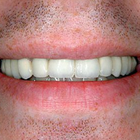
Front view


Front view
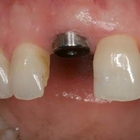
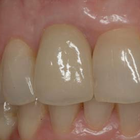
Front view
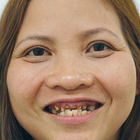

Front view

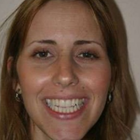
Front view
WHY US?
At Medijump, we're making medical easy. You can search, compare, discuss, and book your medical all in one place. We open the door to the best medical providers worldwide, saving you time and energy along the way, and it's all for FREE, no hidden fees, and no price markups guaranteed. So what are you waiting for?

Free

Best Price

Widest Selection

Risk-Free
What you need to know about Dental Implant in Poland

A dental implant is a medical device that provide support to artificial teeth. It's surgically placed into the jaw to act as a replacement for the root of a missing or damaged tooth, which in turn serves to hold a replacement tooth or bridge. It functions and looks much like a real tooth, restoring your ability to chew and improves your overall appearance. Dental implant surgery is considered as a better alternative to dentures or bridgework that does not fit well. It also offers a great option for people when they do not have enough natural teeth roots left to build denture or bridgework replacements.
Since dental implants eventually fuse with your jawbone over the span of several months, it won’t make noise, slip, or cause bone damage the way dentures or bridgework might. Dental implants also enable natural speech, look and feel like your own teeth, make eating easier, and improves your appearance. However, the surgery may involve several stages, and, in some cases, it may require two separate visits to the clinic to complete. Ensure to look for a specialist in a reputable clinic for the best results.
What is the cost of Dental Implant in Poland?
Price differences abound in Poland for Dental Implant based on the clinic, the proficiency of the surgeon, and the individual requirements of the patients. It's essential to realize that dental insurance usually doesn't cover the entire bill for this treatment, though it might cover a part. Several dental clinics provide finance schemes or payment alternatives to assist in easing the financial burden. For more precise cost estimates, reach out to your dental service provider or a nearby clinic.
What does a Dental Implant Procedure Involve?
Dental implant surgery generally requires several stages. Each stage may be performed under general or local anesthetic. The first stage is removing the damaged tooth. Then, if your jawbone is too soft or not thick enough, your dentist may perform bone grafting to create a more solid base for the implant. The bone graft may be natural (taken from another part of your body) or synthetic (a bone-substitute material). If you only need minor bone grafting, the implant surgery can be performed on the same day. However, if you need a significant amount of bone graft, the implant surgery may have to be postponed until the transplanted bone grows enough new bone to support the dental implant.
The next stage after the damaged tooth removal and bone graft (if you need one) is placing the dental implant. To do this, your dentist makes an incision to expose the bone and puts the metal implant post deep into the bone. At this stage, you will still have a gap where your tooth is missing. Your dentist will place a temporary denture for appearance. Once the metal implant post is placed, osseointegration begins. This is a process where the jawbone grows into the surface of the implant and can take several months to complete. After osseointegration is complete, your dentist will place the abutment, which is a small connector post that will hold your new tooth. The final stage, after the abutment is placed, is placing the crown, which is the tooth-looking part. You can choose between a removable crown and a fixed crown.
How Long Should I Stay in Poland for a Dental Implant Procedure?
The length of your stay in Poland for a Dental Implant depends on numerous considerations like the intricacies of the procedure, the quantity of implants required, and your personal recovery process. Each stage of dental implant surgery is done in separate appointments. After each appointment, you should be able to leave the hospital or clinic right away. However, you should stay in Poland for at least 2 weeks for completion of the work, the initial recovery time, and follow-up checkups.
What's the Recovery Time for Dental Implant Procedures?
The recuperation duration following a Dental Implant or dental implant operation can widely vary and is shaped by multiple aspects. Initial healing of the tissue might require only a handful of days, but complete osseointegration (the fusion of the implant with the jawbone) generally spans several months. This window could be extended for patients requiring auxiliary procedures such as bone grafts, or those with prevailing health issues that may impede the healing process.
Post-procedure, it's not unusual to experience a degree of discomfort, which could manifest as minor pain, swelling of your gums and face, skin and gum bruising, and slight bleeding. Such symptoms are a standard phase of the recovery process and should alleviate within a fortnight. In this interim, it's advisable to stick to a soft diet to not overload the implant site with undue pressure. Any strenuous physical exertion should be put off to circumvent potential complications.
Maintaining excellent oral hygiene is paramount to facilitate healing and stave off infection. Regular brushing and flossing, being particularly gentle around the surgical area, coupled with rinsing your oral cavity with warm saline water, can contribute to keeping the region hygienic.
What sort of Aftercare is Required for Dental Implant Procedures?
After each stage of surgery, you may have to eat soft foods. Since you may experience swelling, bruising, pain, and minor bleeding, your dentist will prescribe pain medications or antibiotics to help ease your discomfort. During your recovery period, you need to avoid smoking as it can contribute to implant failure and complications.
No special care is required for dental implants. Nonetheless, you need to practice good oral hygiene in order to maintain the implant and your remaining natural teeth. Make sure to brush your teeth twice a day, floss daily, and rinse your mouth with an antiseptic mouthwash. You also need to see your dentist regularly and avoid damaging habits, such as chewing hard items.
What's the Success Rate of Dental Implant Procedures?
The efficacy of Dental Implant, alternatively referred to as dental implants, in Poland, is typically impressive, boasting effectiveness percentages as high as 98% in some studies. This positions dental implants as one of the most reliable procedures within dental care's realm. Nevertheless, it's worth mentioning that the success rates might fluctuate, influenced by several factors.
The patient's overall health is a key determinant of the thriving outcome of a dental implant procedure. Individuals exhibiting optimal health usually witness higher success rates. Pre-existing health issues like diabetes, osteoporosis, and periodontal ailments can theoretically impact the efficacy of the implant.
Additional contributing factors to the success rate encompass the quality and abundance of the individual's bone structure. Patients boasting plentiful, healthy bone are ordinarily the perfect candidates for dental implants. However, those who have experienced bone loss might need to undergo a bone grafting procedure before the implant procedure. This step can provide a robust base for the implant and enhance the chances of a successful result.
Are there Alternatives to Dental Implant Procedures?
If you are not a candidate for dental implant surgery, or you simply do not want to undergo the procedure, you can opt for the alternatives. The alternatives include:
- Mini dental implants, which is a small type of dental implants. The structure is similar to regular dental implants, but are somewhat smaller in size. Unlike regular dental implants, dentists can often place mini implants only in one visit using local anesthesia. You may also be able to use your new teeth on the same day.
- A same-day implant is essentially similar to traditional dental implants. However, your dentist performs the whole process in just one day, skipping the process of wound healing and osseointegration.
- Implant-supported dentures or All-on-4 is an alternative if you need to fix a complete upper or lower set of teeth. During this procedure, four to six implants are placed into your jawbone as a base to attach and stabilize your denture.
What Should You Expect Before and After the Dental Implant Procedure?
Grasping what lies ahead before and post the Dental Implant can lessen potential worries and guarantee you are fully equipped for the upcoming journey. Prior to the procedure, your dental practitioner will conduct an all-inclusive dental assessment. This check-up may encompass dental X-rays and sophisticated 3D imaging to examine the status of your oral cavity.
The dental professional will also explore your medical history. If you're suffering from specific heart disorders or orthopedic implants, your dental practitioner might suggest antibiotics to avert infection. A personalized treatment blueprint, customized to your circumstances, will be constructed. This strategy takes into account factors like the amount of teeth you need substituted and the state of your jawbone. The procedure is typically carried out under local anesthesia to mitigate any discomfort.
Subsequent to the operation, experiencing slight unease is usual. You might witness inflammation of your face and gums, discoloration of your skin and gums, soreness at the insertion area, and insignificant bleeding. Your dental specialist will recommend medications to soothe these indicators. In case inflation, unease, or any other complications intensify in the days post-operation, it's crucial to reach out to your oral surgeon. Post-operation will require you to consume mushy foods as the operated site recovers. Moreover, you'll be guided to abstain from smoking, as it can hinder recovery and influence the triumph of the dental implant.
Following the positioning of the implant, the healing process, and fusion with the bone (osseointegration) transpire over an extended period. During this interval, maintaining robust oral cleanliness is vital. This involves frequent brushing, the use of dental floss, and cleansing with an antibacterial mouthwash. Periodic dental examinations are obligatory to track progress and confirm the well-being and effectiveness of the implant.
What are Potential Risks of Dental Implant?
Despite Dental Implant boasting remarkable effectiveness, it is, as any surgical operation, not without risks and potential difficulties. The chances of encountering these issues are often minute and irregularities are infrequent, yet it remains critical for patients to comprehend these possibilities before undertaking the procedure.
Complications and side effects may include:
- Implant failure
- Nerve injury
- Infection
- Sinus problems
- Damage to surrounding structures, such as other teeth or blood vessels
How long does a Dental Implant last?
The durability of a Dental Implant is heavily reliant on the individual's oral cleanliness and general wellbeing. Nonetheless, with appropriate upkeep and care, dental implants have the potential to stand the test of time. The titanium pillar inserted into the jawbone during surgery is crafted to be everlasting, while the dental cap fastened to the anchor may necessitate substitution every decade or decade and a half due to normal usage. Yet, with outstanding dental management and habitual screenings, the cap has the potential for lifelong endurance.
Whilst the information presented here has been accurately sourced and verified by a medical professional for its accuracy, it is still advised to consult with your doctor before pursuing a medical treatment at one of the listed medical providers
No Time?
Tell us what you're looking for and we'll reachout to the top clinics all at once
Enquire Now

Popular Procedures in Poland
Prices Start From $1

Prices Start From $1

Prices Start From $48

Prices Start From $1

Prices Start From $1

Prices Start From $11

Prices Start From $1

Prices Start From $45

Recommended Medical Centers in Poland for Dental Implant

- Interpreter services
- Translation service
- Religious facilities
- Medical records transfer
- Medical travel insurance
- Health insurance coordination
- TV in the room
- Safe in the room
- Phone in the room
- Private rooms for patients available

- Interpreter services
- Translation service
- Religious facilities
- Medical records transfer
- Medical travel insurance
- Health insurance coordination
- TV in the room
- Safe in the room
- Phone in the room
- Private rooms for patients available

- Interpreter services
- Translation service
- Religious facilities
- Medical records transfer
- Medical travel insurance
- Health insurance coordination
- TV in the room
- Safe in the room
- Phone in the room
- Private rooms for patients available

- Interpreter services
- Translation service
- Religious facilities
- Medical records transfer
- Medical travel insurance
- Health insurance coordination
- TV in the room
- Safe in the room
- Phone in the room
- Private rooms for patients available

- Interpreter services
- Translation service
- Religious facilities
- Medical records transfer
- Medical travel insurance
- Health insurance coordination
- TV in the room
- Safe in the room
- Phone in the room
- Private rooms for patients available

- Interpreter services
- Translation service
- Religious facilities
- Medical records transfer
- Medical travel insurance
- Health insurance coordination
- TV in the room
- Safe in the room
- Phone in the room
- Private rooms for patients available

- Interpreter services
- Translation service
- Religious facilities
- Medical records transfer
- Medical travel insurance
- Health insurance coordination
- TV in the room
- Safe in the room
- Phone in the room
- Private rooms for patients available

- Interpreter services
- Translation service
- Religious facilities
- Medical records transfer
- Medical travel insurance
- Health insurance coordination
- TV in the room
- Safe in the room
- Phone in the room
- Private rooms for patients available

- Interpreter services
- Translation service
- Religious facilities
- Medical records transfer
- Medical travel insurance
- Health insurance coordination
- TV in the room
- Safe in the room
- Phone in the room
- Private rooms for patients available

- Interpreter services
- Translation service
- Religious facilities
- Medical records transfer
- Medical travel insurance
- Health insurance coordination
- TV in the room
- Safe in the room
- Phone in the room
- Private rooms for patients available
Dental Implant in and around Poland
About Poland
Poland, as one of Central Europe's most expansive nations, has only recently begun to make its mark as a key player in the realm of Medical Tourism. Being particularly appealing to tourists from neighboring regions, many visitors arrive seeking Dental Implant procedures. Poland's open border policy further simplifies travel between its territory and other countries within the European Union (EU), making it an accessible destination for many.
The Polish healthcare system comprises a blend of public and private establishments. While none of these facilities hold JCI accreditation, they are endorsed by local accreditations issued by the Polish Ministry of Health. Their recognition within the European Union testifies to the quality and reliability of these certifying bodies.
In Poland, the most frequently sought-after medical procedures encompass dental, cosmetic, orthopedic, and bariatric treatments. Impressively, the costs of these treatments are significantly lower than what one would expect to pay in Poland's Western European counterparts. Beyond Poland's vibrant capital, Warsaw, cities such as Krakow, Jelenia Gora, and Wroclaw have emerged as favored destinations among medical tourists.
Popular Parts of Poland
Poland, with a population exceeding 38.5 million, is a nation steeped in rich history and recognized for its whopping fourteen UNESCO World Heritage Sites. Despite frequently being overshadowed in the realm of tourism, the country in reality, boasts of a multitude of alluring attractions waiting to be explored and appreciated.
- Warsaw, Poland’s capital provides tourists with a mix of old and new. Restored Gothic buildings and modern glass structures stand side by side. The city offers a scenic view. Wander around the streets of Old Town to see the oldest part of the city. Warsaw was also the former home of Frederic François Chopin; tourists can retrace his steps by visiting Saxon Garden, where Chopin’s family used to live next door.
- Krakow is Poland’s former capital. The city is full of charms; from cobbled streets, beautiful squares, pretty buildings, churches, and a castle. Wawel Castle, located in the Old Town area, is an architectural wonder with medieval, baroque, and renaissance style. The city has numerous museums that provide insights into its fascinating history.
- Gdansk stands as one of the country's most breathtaking seaside cities. It houses some of the finest museums in Poland and is renowned for its thriving nightlife and diverse culinary scene. Visitors are encouraged to admire the vibrant street art, delve into history at the numerous museums, explore the charms of the Old Town, and embark on a gastronomic adventure with a food tour in Gdynia. In a nutshell, Gdansk offers a rich and memorable travel experience.
- Poznan will amaze tourists once they see its vibrant, playful, and unique treasures. As the birthplace of the Polish nation, the city offers many historical attractions as well as urban green spaces. Tour the Lech Brewery to learn more about the brewing process of beer visit the Old Market Square and find an array of bars and food stalls.
- Wroclaw is not as popular as other cities in Poland. It’s actually full of attractions, incredible architecture, and hidden gems. Tourists will find dwarf statues throughout the city and can go on the dwarf trail. Market Square is the city’s centerpiece that blends colorful buildings and gives a scenic view, especially in winters.
Weather and Climate in Poland
Poland has a temperate climate and sometimes experiences rough weather. Spring starts in late March to May. The season is characterized by a wave of warmer weather with less frequent rain. It is one of the best times to visit Poland because the temperature is comfortable.
Poland's summer season extends from June until August and brings with it a certain unpredictability in weather patterns. The general climate is warm, with temperatures hovering between 18 to 30°C. Amidst sunny spells and elevated temperatures, frequent rain showers and storms are also common phenomena. This period marks the peak of the tourism season and tourists can expect prices to see a corresponding increase. Despite the occasional rains, summer promises a delightful time to experience Poland in all its warmth.
September to November is Autumn, the season where the temperature starts to drop. Late September and October are still warm, while November is cold and wet. Sunny days during this season are known as “Polish Golden Autumn.”
Winter in Poland, which runs from December until early March, can be exceedingly cold. Temperatures often tumble to an average range of 0 to -10°C and can even drop as low as -20°C. Despite the chilly conditions, this is actually the peak season for mountain ski resorts, attracting numerous enthusiasts to take advantage of Poland's picturesque winter landscapes.
Getting Around in Poland
Most international flights arrive at Warsaw Frederic Chopin Airport. It’s Poland’s largest and busiest airport. The airport serves domestic and has International connections with many cities around the world. It is the hub for LOT Polish Airlines. Budget airlines such as Wizz Air and EasyJet also operate flights from this airport. There is a smaller airport, Warsaw Modlin Airport, which handles more budget airlines.
To get to the city center, bus, taxi, and train are available. There are five public buses that stop at Warsaw’s city center; bus 175, bus 188, bus 148, bus 331, and bus N32 (night bus). Taxis are available, but always make sure to use licensed taxi services. The fare from the airport to the city center is around 40 PLN. Chopin Airport is linked to Legionowo and Sulejówek Miłosna by a railway service. Tourists can buy ZTM tickets to ride the bus and train which can be purchased at the Passenger Information Point in the arrivals hall, ticket machines at bus stops and train station entrance, or from bus drivers.
Ample public transportation options simplify getting around in Poland. Trains, in particular, offer an incredibly budget-friendly means of travel. For instance, the journey from Krakow to Warsaw is set to cost approximately 45 PLN and spans a duration of around three hours. Meanwhile, a slightly longer five-hour train journey from Warsaw to Gdansk can be undertaken at a reasonable fare of around 65 PLN. Such connectivity and affordability make exploration within Poland both easy and economical.
Within the cities, local buses in the central zone cost around 4 PLN (a single-fare ticket). Major cities offer one-day tickets for 20 PLN. Taxis are relatively cheap and tourists can get around the city quickly. Taxis are metered and usually start at around 6 PLN to 8 PLN. Unlicensed taxi drivers are most likely to cheat and charge more. There are taxis that put a fake phone number in their cars, be careful and ask your hotel staff for the number of the taxi company they have used previously. Cycling is a good way to explore the scenery in Poland. There are many bike rentals around the country, always be aware of drivers since some are careless.
For cities like Krakow, tourists are highly recommended to secure tourist cards. These cards provide unlimited access to public transportation for a period of one to three days. In addition, they also offer free or discounted admission to several museums. This is a great bargains that grants tourists flexibility and sizable savings to fully relish their visit.
Tourist Visas in Poland
Poland is part of the Schengen Area. Citizens of the United States, Canada, Australia, New Zealand, Japan, Israel, and several other countries do not need to obtain a visa and can stay in Poland for up to 90 days. EU citizens do not need a visa and can stay indefinitely. Other nationalities must check with their local Polish embassy. All visitors must hold a passport valid for at least six months.
Additional Information about Visa in Poland:
- It is important to note that the visa requirements for Poland can change at any time, so it is always best to check with the Polish embassy or consulate in your home country before you travel.
- If you are planning to stay in Poland for longer than 90 days, you will need to apply for a visa. You can do this at the Polish embassy or consulate in your home country.
- When applying for a visa, you will need to provide a number of documents, including a valid passport, proof of travel insurance, and proof of financial means.
Additional Information
- Local Currency: the official currency is the Polish złoty (PLN). 1 USD converts to 4.21 PLN.
- Money & Payments: ATMs are available in cities and towns; even small villages should have at least one. The best way to exchange rates is at banks or withdrawing money from ATMs. Credit cards (Visa and MasterCard) are accepted in most hotels and restaurants. Always carry small cash and coins for shops and cafes. Tipping in Poland is mostly optional. In restaurants, 10% is the standard. Room-service staff and porters in hotels expect to be tipped. Taxis don’t expect tips.
- Local Language: The official language is Polish. Most of the locals in the tourist areas will have decent English. Foreign tourists should be aware that all official information including street signs and directions are only written in Polish.
- Local Culture and Religion: Christianity is the largest religion in Poland with 87.5% of the population identified as Roman Catholic.
- Public Holidays: Poland celebrates major Christian holidays such as Christmas and Easter. The country hosts many festivals throughout the year such as St. Dominik’s Fair every July to August, Light & Move Festival every October, and Ice Festival every December.
Popular Searches
- Plastic Surgery in Thailand
- Dental Implants in Thailand
- Hair Transplant in Thailand
- Breast Augmentation Thailand
- Gastric Sleeve in Thailand
- Gender Reassignment Surgery in Thailand
- Laser Hair Removal in Bangkok
- Botox in Bangkok
- Dermatology in Bangkok
- Breast Augmentation in Bangkok
- Coolsculpting in Bangkok
- Veneers in Turkey
- Hair Transplant in Turkey
- Rhinoplasty in Turkey
- Stem Cell Therapy in Mexico
- Rhinoplasty in Mexico
- Liposuction in Mexico
- Coolsculpting in Tijuana
- Rhinoplasty in Korea
- Scar Removal in Korea
- Gastric Sleeve in Turkey
- Bone Marrow Transplant in India
- Invisalign in Malaysia
- Plastic Surgery in the Dominican Republic
- Tummy Tuck in the Dominican Republic
- Plastic and Cosmetic Surgery in Poland
- Rhinoplasty in Poland
- Hair Implant in Poland
- Dental Implants in Poland
- IVF in Turkey


















